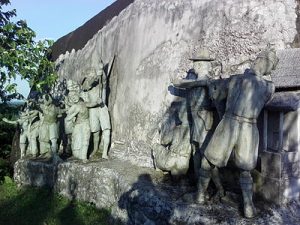The British did not try to expand their territory to the northeast of India because they followed a policy of non intervention towards the Ahom kingdom. It was only when the Burmese had established authority in Assam through a series of invasions that the British were compelled to abandon their policy of non-intervention towards Assam. The first Anglo-Burmese war (1824-26) paved the way for the establishment of British administration in Assam.
The Treaty of Yandabu (To be explained latter) treaty brought peace between East India Company and the King of Ava that ended the first Anglo-Burmese war.The agreement was signed on February 24,1826 by General Sir Archibald Campbell on the British side and by Governor of Legaing Maha Min Hla Kyaw Htin of the Burmese side. This treaty starts the British Rule in Assam.
As per this treaty:
- Assam, Manipur, Arakan,were ceded to British.
- Burmese had to desist opposition in the Chachar Kingdom and Jaintia Hills.
- Burmese agreed to pay an compensation of One Million Pounds Sterling to British.
- Burmese decided to allow diplomatic ambassadors from British.
Britishers retained Lower Assam and placed Upper Assam in the hands of Ahom King Purandar Singha on a tribute.
David Scott laid the foundation of the British administration in Assam. The provisional administration of Assam in 1824-25 finally led to the permanent annexation of Assam. The two ex- kings of Assam Chandrakanta Singha and Purandar Singha were not allowed by the British to return to Rangpur and instead got them settled at Guwahati.
In 1828, the Kachari kingdom was annexed under the Doctrine of Lapse after the king Govinda Chandra was killed. In 1832, the Khasi king surrendered and the British increased their influence over the Jaintia ruler. In 1833, upper Assam became a British protectorate under the erstwhile ruler of the Ahom kingdom, Purandhar Singha, but in 1838 the region was formally annexed into the British empire. With the annexation of the Maran/Matak territory in the east in 1839, the annexation of Assam was complete.
- APSC Mains 2024 Tests and Notes Program
- APSC Prelims Exam 2020- Test Series and Notes Program
- Apsc Prelims and Mains 2024 Tests Series and Notes Program
- Apsc Detailed Complete Prelims Notes

 and join our Telegram channel: https://t.me/pscnotes2025](https://assam.pscnotes.com/wp-content/plugins/feeds-for-youtube/img/placeholder.png)